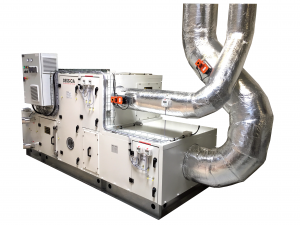
Dehumidifier for pharmaceutical processes
Dessica ™ Systems’ provide dry air throughout the manufacturing and packaging processes of many pharmaceutical products. They allow an optimal control of the ambient humidity conditions for the fluidity of the powder conveying and the drying of the heat-sensitive products. We will help you overcome these challenges.




The dehumidifier for laboratory equipment you’ve all been waiting for
The pharmaceutical industry is a multi-billion dollar global business where the role of the manufacturing environment plays a critical part in the quality of the end product. Various environmental factors can have an impact on product quality, one of the most important being atmospheric humidity. A laboratory dehumidifier is a must for any maker of pills, tablets, capsules and other medication. In the absence of any kind of humidity control for laboratory equipment, variations in the level of humidity in the manufacturing environment can play havoc with tablet coatings. Furthermore, the absence of dry air can create challenges with regard to the flow of powder, which can have a knock-on effect on filling gelatine capsules with powdered ingredients. Properly controlled levels of humidity are also useful in terms of ensuring the end product retains all its core properties and functions as it’s designed to do.
The role of the laboratory dehumidifier in the dry room environment
The pharmaceuticals sector isn’t the only industry to use dehumidifiers for laboratory equipment and workplaces. The wider chemical industry also employs humidity control system technology, notably in what are called ‘dry rooms’ or ‘clean rooms’. The term ‘clean rooms’ is a nod to the principal role of solutions designed to deliver humidity control for laboratory equipment, namely the removal of contaminants from the air. Excessive humidity is an issues can be tackled by using Dessica’s desiccant silica gel rotor systems. Reducing relative humidity to extremely low levels makes it both easier to manufacture products to meet consistent quality levels and facilitates the storage of certain items often found in the chemical industry field, including lithium ion batteries. Clean room dehumidification also delivers clear economic benefits in the shape of reduced wastage, improved production yields and reduced energy consumption.
Main benefits of dessica dehumidification systems
- Preserves from degradation and retains the intrinsic qualities of the product
- Maintain a low relative humidity easily in tablet preparation process (often less than 40%)
- Allows a faster and more uniform water evaporation for Coating process
- Improve the filling phase of powders or liquids in gelatin capsules
- Reduce losses and increases performance
- Desiccant dehumidification for pharmaceutical industry
Advantages for pharmaceutical processes
- Preparation of tablets: In certain stages in tablet preparation, it is essential to maintain a low relative humidity, often below 40%. DESSICA systems allow the required conditions to be achieved regardless of the climatic conditions.
- Coating: The introduction of dry air into the coating pans via a DESSICA system allows faster and more uniform evaporation of water from the product.
- Gelatin capsules: Dry and sterile air is essential during the phase in which gelatin capsules intended to hold medications are filled with powders or liquids. Mastery of the different dry air technologies allows DESSICA to fulfil these requirements perfectly.
Clean room dehumidification for the chemical and electronics industries
A clean room is an artificially-created environment characterized by very low levels of particulates such as dust and microbes. The ability to control humidity in a cleanroom is of crucial importance in a range of industries, including the chemical, electronics and food processing sectors, as well as the pharmaceutical industry. A dry room, meanwhile, is a room where the relative humidity is strictly controlled. With the right clean room dehumidification approach, it’s possible to reduce relative humidity levels to 20% or even as low as under 2%.
These very low levels of humidity are needed during the manufacturing processes of everything from semiconductors and solar panels to LEDs and rechargeable batteries. In the case of the lithium-ion battery manufacturing environment (these being the batteries that are commonly used to power electric vehicles), extremely low levels of humidity must be maintained around -50°C Dew Point (DP)
Clean room humidity control thanks to the Dessica desiccant rotor
The technology at the heart of Dessica’s ability to control humidity in a cleanroom is a silica gel-based desiccant wheel system. This wheel, also called a rotor, is mostly composed of active silica gel, with glass fiber and an smaller amounts of acrylic surface coating. The rotor works by having air blown through the wheel, with the silica gel then capturing moisture from the humid air. A second flow of air, called reactivation air, is heated and then blown back through the rotor, drying the silica gel out and ensuring it can be used again. This rotor has excellent fire resistance properties and is capable of handling very high levels of relative humidity.
What’s more, Dessica recently filed a new patent that will enable rotor speed to automatically adjust to changes in temperature and humidity, making for an even more energy-efficient (and therefore cost-efficient) approach to dehumidification across the range of industries with which Dessica currently works.
Benefits of Dessica dehumidifier in anhydrous room
- Provide an anhydrous environment essential for research on batteries of electric vehicles
- Provide a controlled dew point atmosphere to avoid interaction between water in the air and the components of a battery
- Prevent oxidation of the tested chemical elements (lithium)
- Maintain a dry atmosphere by hosting several people





